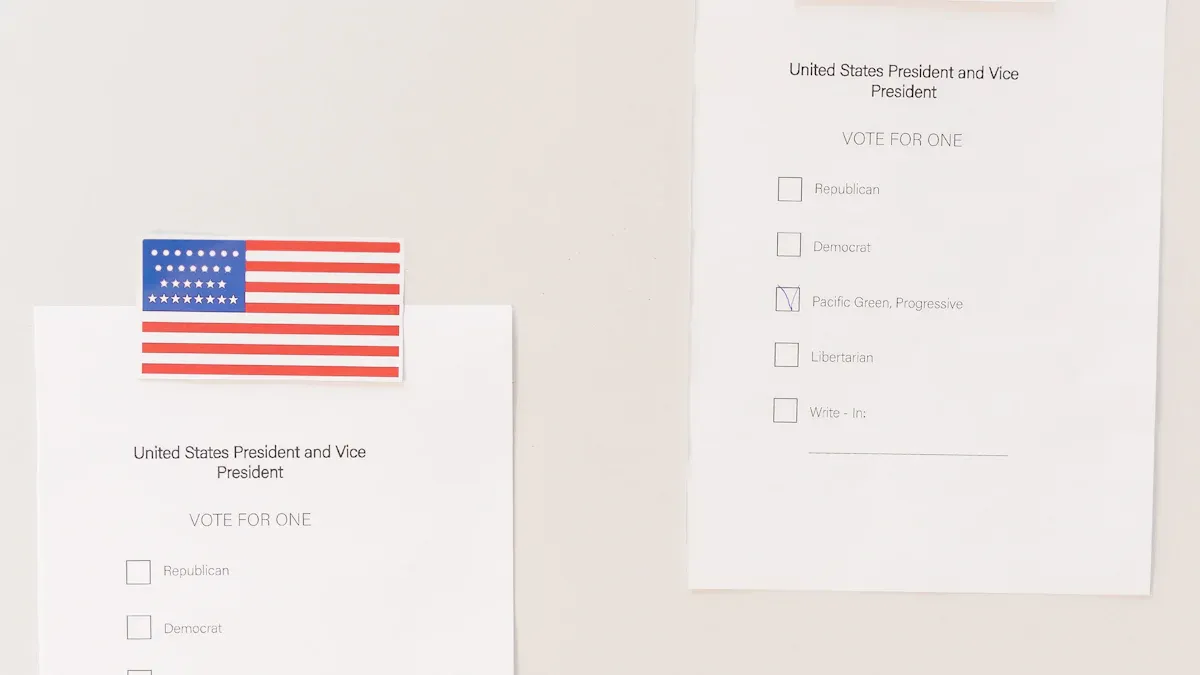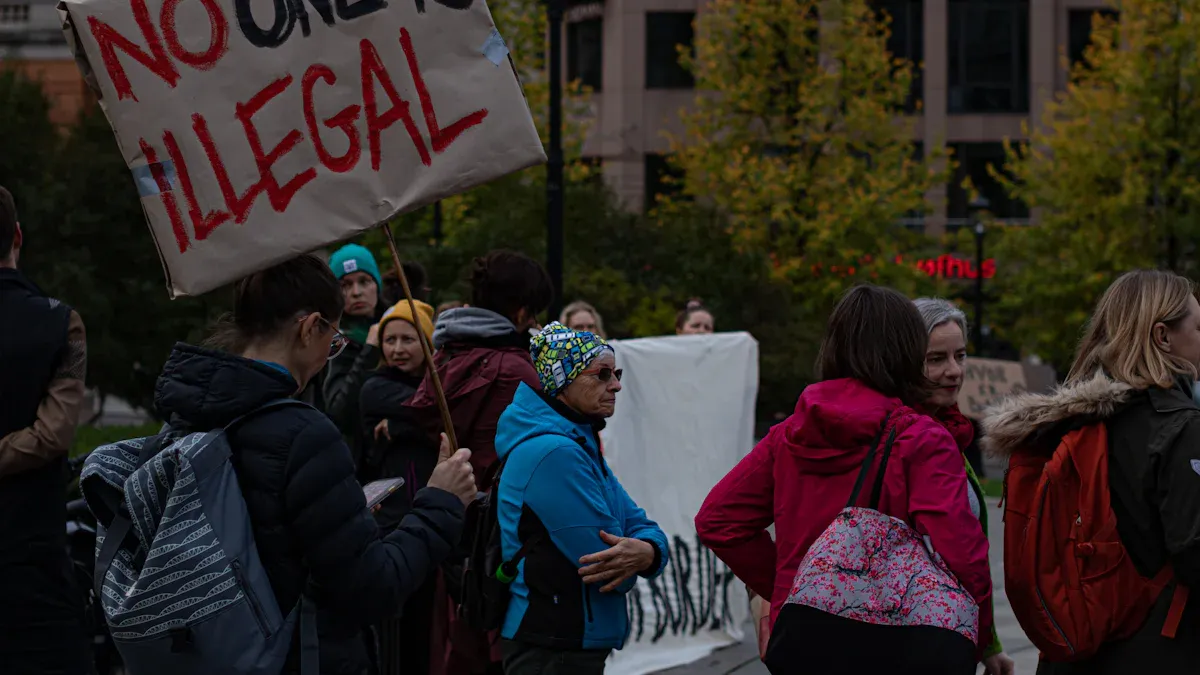- EasyCard
- Trade
- Help
- Announcement
- Academy
- SWIFT Code
- Iban Number
- Referral
- Customer Service
- Blog
- Creator
Can Green Card Holders Vote? A Complete Guide to Permanent Resident Voting Rights

Image Source: pexels
You hold a U.S. green card but cannot participate in any U.S. election voting. U.S. law clearly states that only U.S. citizens have voting rights. Many people mistakenly believe green card voting rights are equivalent to citizen voting rights, but they are entirely different. You need to understand that a green card only signifies permanent resident status and does not automatically grant voting rights.
Note: Misusing green card voting rights can lead to serious consequences.
Key Points
- Green card holders have no voting rights in U.S. federal, state, or most local elections; only U.S. citizens can legally vote.
- Illegally voting with a green card status can lead to fines, imprisonment, and green card revocation, among other serious legal and immigration consequences.
- Very few cities allow permanent residents to participate in specific local elections, but this does not affect the strict restrictions on federal and state elections.
- The only legal way to gain voting rights is through naturalization to become a U.S. citizen, completing the relevant application and oath process.
- Understand and comply with voting laws to avoid breaking the law due to misunderstanding, protecting your legal status and future in the U.S.
Green Card Voting Rights Legal Regulations

Image Source: pexels
Voting Limited to Citizens
U.S. law stipulates that only U.S. citizens can vote in federal, state, and most local elections. If you are only a green card holder, even if you have lived in the U.S. for many years, you cannot participate in any form of election.
You need to pay special attention: whether it’s a presidential election, congressional election, or local elections for governor or mayor, the law requires voters to have U.S. citizenship.
The U.S. Citizenship and Immigration Services (USCIS) and state election offices explicitly state that permanent residents have no voting rights. When you apply for a driver’s license, benefits, or other government services, staff will also remind you that you cannot participate in voting. If you mistakenly believe green card voting rights are equivalent to citizen voting rights, you may violate the law due to ignorance of the regulations.
Difference Between Green Card and Citizenship
You need to clearly distinguish between a green card and U.S. citizenship. A green card indicates you are a permanent resident of the U.S., able to legally reside, work, and study, but it does not equate to having full citizen rights. The table below helps you understand the main differences more clearly:
| Rights/Duties | Green Card Holder | U.S. Citizen |
|---|---|---|
| Voting Rights | × | √ |
| Apply for U.S. Passport | × | √ |
| Full Citizen Rights | × | √ |
| Run for Public Office | × | √ |
| Permanent Residency | √ | √ |
As a green card holder, although you enjoy many rights, green card voting rights do not exist. Only by becoming a U.S. citizen through naturalization can you legally participate in U.S. elections at all levels.
Friendly Reminder: Do not risk voting due to a misunderstanding of green card voting rights, as this can lead to serious consequences.
Voting Scope
Federal Elections
You cannot participate in U.S. federal elections. Federal elections include presidential elections, Senate, and House of Representatives elections. The U.S. Constitution and federal law stipulate that only U.S. citizens are eligible to vote.
For example: Even with a green card, you cannot go to a polling station on presidential election day to vote. Staff will verify your citizenship status. Federal elections have very strict voter eligibility requirements. If you attempt to register or vote, it may be considered illegal.
State Elections
You also cannot participate in state elections. State elections include elections for governor, state legislators, and state supreme court justices. Every state requires voters to be U.S. citizens. When you apply for voter registration, the system will require you to provide citizenship information.
- You cannot register as a voter with a green card status.
- You cannot vote or participate in related activities in state elections.
Reminder: State elections, like federal elections, have strict voter eligibility restrictions. You need to comply with relevant legal regulations.
Local Election Exceptions
Very few cities or regions allow non-citizens to participate in certain local elections. For example, some cities permit permanent residents to vote in school board or district board elections. The table below lists common cases:
| Region | Green Card Holders Allowed to Vote | Election Type |
|---|---|---|
| New York City | × | Mayor, Council Members |
| San Francisco Some School Districts | √ | School District Board |
| Chicago | × | Local Officials |
You need to note that these exceptions are extremely rare. Most local elections still only allow U.S. citizens to vote. You should carefully check local election regulations before participating to avoid breaking the law due to misunderstanding.
Friendly Reminder: Even if some regions have exceptions, you cannot vote in federal or state elections. Only after becoming a U.S. citizen can you fully participate in all U.S. elections.
Legal Consequences

Image Source: pexels
Criminal Penalties
If you vote in U.S. elections with a green card status, you will directly violate U.S. federal and state laws. U.S. law has clear criminal penalties for illegal voting. You may face the following consequences:
- Fines: Federal law stipulates that illegal voters can face fines up to $10,000 USD (approximately 1 USD = 7.2 RMB).
- Imprisonment: You may face up to five years in prison.
- Criminal Record: Once convicted, you will have a permanent criminal record, affecting your life and work in the U.S.
For example: In 2017, a green card holder in Texas was sentenced to eight years in prison for voting in a presidential election. She claimed ignorance of the law, but the court still found her guilty. You can see that the law does not excuse violations due to ignorance.
Filling out false information during voter registration is also considered document forgery, which is a criminal offense. You need to stay vigilant to avoid breaking the law due to negligence.
Immigration Risks
If you vote illegally, you will not only face criminal penalties but also affect your immigration status. The USCIS considers illegal voting a “crime of moral turpitude.” You may face the following immigration risks:
- Green Card Revocation: You may lose your permanent resident status, and your green card will be revoked.
- Deportation: The U.S. government has the authority to deport you, requiring you to leave the U.S. and preventing your return as a permanent resident.
- Naturalization Denial: If you have an illegal voting record, your naturalization application will almost certainly be denied. Immigration officers will deem you as not meeting the “good moral character” requirement.
The table below summarizes the immigration consequences of illegal voting:
| Action | Possible Consequences | Scope of Impact |
|---|---|---|
| Illegal Voting | Green Card Revocation | Permanent Resident Status |
| False Registration | Deportation | U.S. Residency Rights |
| Criminal Record | Naturalization Denial | Citizenship Eligibility |
Real Case: A green card holder in California voted in a local election, was discovered by the USCIS, had their green card revoked, and was deported. They had planned to apply for naturalization, but the criminal record permanently barred them from becoming a U.S. citizen.
You need to understand that illegal voting is not just a violation of election rules but can also affect your future in the U.S. If you want voting rights, the only safe path is through legal naturalization. Do not jeopardize your opportunity to live in the U.S. due to impulsive actions.
Misconceptions and Special Cases
Common Green Card Voting Misconceptions
You may have heard some incorrect claims about green card voting rights. Many believe that holding a U.S. green card allows participation in U.S. elections, but this is not true. You need to be aware of the following common misconceptions:
- You hold a green card, can permanently reside, work, and access social benefits in the U.S., but you have no voting rights in federal elections (source).
- You cannot vote in presidential, governor, mayor, or legislator elections at any level, nor do you have the right to run for these offices.
- You still hold your original nationality’s passport and cannot obtain a U.S. passport, highlighting the fundamental difference between green card and citizenship status.
- Voting rights are a core right of U.S. citizens, and green card holders are excluded from voting and political participation due to their non-citizen status.
Friendly Reminder: If you have questions about green card voting rights, consult the USCIS or local election offices directly to avoid breaking the law due to misunderstanding.
Rare Local Election Exceptions
In very few U.S. cities, you may encounter situations where non-citizens are allowed to participate in certain local elections. For example, some cities permit permanent residents to vote in school district board elections. You need to carefully review local election regulations to confirm eligibility. The table below shows some special cases:
| City | Green Card Holders Allowed to Vote | Election Type |
|---|---|---|
| San Francisco Some School Districts | Yes | School District Board |
| New York City | No | Mayor, Council Members |
In most cities and states, you still cannot participate in any elections. Even with exceptions, they are limited to specific local election types. You cannot vote in federal or state elections.
Impact on Naturalization Applications
If you vote with a green card status, it will severely impact future naturalization applications. The USCIS considers illegal voting a “crime of moral turpitude,” leading to application denial. You need to maintain good moral character and comply with U.S. laws.
Reminder: Only after becoming a U.S. citizen can you legally gain voting rights. Illegal voting not only affects your green card status but may also prevent you from obtaining U.S. citizenship.
Path to Voting Rights
Naturalization Process
To gain U.S. voting rights, you must first become a U.S. citizen. The naturalization process includes the following steps:
- Meet Residency Requirements: You need to hold a green card for at least five years. If married to a U.S. citizen, it’s typically three years.
- Submit Application: You need to complete Form N-400 and pay the application fee. The standard fee in 2024 is $640 (approximately 4,608 RMB at 1 USD = 7.2 RMB).
- Fingerprint Collection: The USCIS will schedule you for fingerprinting and a background check.
- Attend Interview: You need to attend a naturalization interview, answering questions about U.S. history, government, and English proficiency.
- Take Oath of Citizenship: After passing the interview, you will receive an oath ceremony notice. After the oath, you officially become a U.S. citizen.
Tip: During the application process, maintain good moral character and avoid criminal records or immigration violations. The USCIS will thoroughly review your background.
The table below summarizes the main naturalization requirements:
| Condition | Specific Requirements |
|---|---|
| Green Card Duration | 5 years (3 years if married to a U.S. citizen) |
| Residency Requirement | Reside in the U.S. for at least 30 months in the past 5 years |
| English Proficiency | Ability to communicate in English |
| Civic Knowledge | Pass U.S. history and government test |
| Moral Character | No significant criminal record |
Voting Rights After Naturalization
After completing naturalization, you can legally gain U.S. voting rights. You can register as a voter in federal, state, and local elections. The U.S. government will issue you a Certificate of Citizenship, which you can use to apply for a U.S. passport.
After naturalization, you have the following rights:
- Vote in presidential, congressional, governor, mayor, and other elections at all levels.
- Apply for a U.S. passport, enjoying international travel benefits as a U.S. citizen.
- Run for public office and participate in U.S. political life.
Note: Only as a U.S. citizen can you enjoy full voting rights. You are no longer restricted by green card status and can freely participate in U.S. societal affairs.
If you plan to live in the U.S. long-term and participate in societal decision-making, naturalization is the only legal path to voting rights. Plan the naturalization process early to ensure a smooth transition to U.S. citizenship.
You cannot participate in any U.S. elections with a green card. Green card voting rights do not exist, and illegal voting can lead to criminal penalties and immigration risks. The only legal path to voting rights is naturalization to become a U.S. citizen. Comply with the law, plan the naturalization process, and legally participate in U.S. elections.
FAQ
Can green card holders vote in any U.S. elections?
You cannot vote in any U.S. federal, state, or most local elections. Only U.S. citizens have voting rights.
What are the consequences of voting illegally?
You may face fines, imprisonment, and loss of green card status. The USCIS will record your violation.
What changes to voting rights occur after becoming a U.S. citizen?
After naturalization, you can participate in all U.S. elections. You can register as a voter and legally vote for president, legislators, and more.
Can green card holders vote in Chinese elections?
If you hold a U.S. green card, you can still participate in relevant elections in China. A U.S. green card does not affect your voting rights in China.
Is it true that some places allow non-citizens to vote?
In very few cities, you may participate in certain local elections, but most regions only allow U.S. citizens to vote. Check local regulations in advance.
You now know that as a green card holder, you do not have the right to vote in the U.S., and illegal voting carries severe legal and immigration consequences. The only way to gain voting rights is to become a U.S. citizen through a lengthy and complex naturalization process, which means you cannot participate in U.S. political life until you obtain citizenship.
As a permanent resident, another major pain point is dealing with global financial transactions, as traditional banking services are often complex and expensive.
To solve these issues, we recommend a more efficient and cost-effective global financial service platform: BiyaPay. BiyaPay offers transfer fees as low as 0.5% and supports same-day remittance and arrival, greatly simplifying your cross-border fund management. Whether you need to send money home or make international payments, BiyaPay provides secure and transparent service. You can also use our real-time exchange rate lookup to always get the best rates. Register now to begin your new global financial journey.
*This article is provided for general information purposes and does not constitute legal, tax or other professional advice from BiyaPay or its subsidiaries and its affiliates, and it is not intended as a substitute for obtaining advice from a financial advisor or any other professional.
We make no representations, warranties or warranties, express or implied, as to the accuracy, completeness or timeliness of the contents of this publication.




Contact Us
Company and Team
BiyaPay Products
Customer Services
is a broker-dealer registered with the U.S. Securities and Exchange Commission (SEC) (No.: 802-127417), member of the Financial Industry Regulatory Authority (FINRA) (CRD: 325027), member of the Securities Investor Protection Corporation (SIPC), and regulated by FINRA and SEC.
registered with the US Financial Crimes Enforcement Network (FinCEN), as a Money Services Business (MSB), registration number: 31000218637349, and regulated by FinCEN.
registered as Financial Service Provider (FSP number: FSP1007221) in New Zealand, and is a member of the Financial Dispute Resolution Scheme, a New Zealand independent dispute resolution service provider.



















